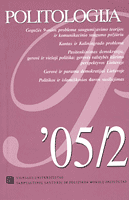Kaip apibūdinti dabartį?
How to define the present time?
Author(s): Bronislovas KuzmickasSubject(s): Politics / Political Sciences
Published by: Vilniaus universiteto leidykla & VU Tarptautinių santykių ir politikos mokslų institutas
Keywords: developments after collapse of communism; post-communist period; post-soviet period; post-colonial period; after-communist (pokomunistinis) period; after-soviet (posovietinis) period; after-socialist (posocialistinis) period; transition;
Summary/Abstract: It is generally received that there are no precedence in the history for the developments, to which East and Central European countries are undergoing after the collapse of communism. Nevertheless this historical time still has no clear conceptual definition. The question arises on how to define appropriately this period and to find suitable concepts to identify it. In the first part of the article the analysis of some generally used concepts, specifying the period – post-communist, post-soviet, post-colonial – as well as such like after-communist (pokomunistinis), after-soviet (posovietinis), after-socialist (posocialistinis) is presented. These concepts are considered to be unsatisfying because they give a rather negative definition of the period, indicating the link with the communist past, but fail to designate anything new in the positive sense.The same applies to the concept post-colonial. Regarding the concept post-communist one can notice that it deals with the process, launched not just after the factual collapse of the communist rule. It deals with the process that has existed since long time before. It is reflected in the dissident and the other nonconformist attitudes. The concept emerging democracies indicates the direction of the changes as something new and positive. At the same time, however, it is not adequate since not all countries with the communist past are moving towards democracy. The author considers the concept transition period as the most suitable. Regarding Lithuania as well as the other countries of the region, one can single out several positions specifying the transition “from – to” as following: from occupation – to independence; from totalitarianism – to democracy; from command – to free market economy; from isolated – to open society; from Eastern–Western political and cultural area etc. The process of the transition has been motivated mainly by the aspiration to restore the state's independence. The identity of the transition period can be characterized by a number of aspects, entitled as following – independence, democracy, free market economy, nationality, citizenship, openness, Western orientation. The aspects of transition are closely interralated, but are not simultaneous and do not necessarily match each other. One can take note of a sort of incompatibilities and tentions between some of them, namely between the values of democracy and the requirements of market economy, between openness and care for national identity etc. At the same time there are changes in terms of how the present situation is assessed. It turns more to be estimated more from the perspective of the euro-atlantic future, than from the communist past. The identity of the present time is characterized by the junction of both perspectives.
Journal: Politologija
- Issue Year: 2003
- Issue No: 3 (31)
- Page Range: 2-20
- Page Count: 18
- Language: Lithuanian

